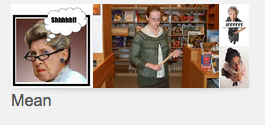The Beguiling of Merlin, Burne-Jones, 1872-77
In Taylor’s essay it became apparent that the Pre-Raphaelites erotized women that held knowledge, but this was contrary to the predominant images of women with intellect. Victorian society made bookish women out to be old maids or women who neglected the duties of the home. In a drawing by George Cruikshanks, the mother is solely concentrating on her books while her children wreak havoc and her husband is completely out of sorts. These types of women never appear attractive or sexualized – they look disheveled or outright unappealing. This strict binary that existed was probably detrimental to women’s pursuit of knowledge and/or happiness. I can consider these cartoons to be absurd since they are of the past, but the realization that they are still present perpetuates a detrimental persona.
Think of the image that comes to mind when you think of a librarian. The image that has been made popular is an older, dowdy woman with glasses wearing her hair in a bun. This image is present in films, television shows, and even stock images on Google. While searching for an image of a librarian the suggested search categories gave even more telling proof that this stereotype is still present.
In line with the Pre-Raphaelite sensual variation on the woman with knowledge, there is our own modern day variation. The “sexy (insert profession title here) costume” is present every Halloween or every so often in a show. The sexy librarian, teacher, or nurse are very present and emphasize how a binary still exists. The costumes are not just called librarians, teachers, or nurses because these professions could never be connected to attractiveness – an intervention is required.

Destiny, Waterhouse, 1900 Whttps://upload.wikimedia.org/wikipedia/commons/5/5d/Destiny_-_John_William_Waterhouse.jpgaterhouse, 1900



I am interested in how you've connected the issues surrounding the representation of educated women in the 19th century with how perceptions in contemporary society still tend to mock or devalue the roles seen as being primarily occupied by women.
ReplyDeleteYou have a very interesting point that Halloween costumes of roles that are generally seen as occupied by women are redesigned as sexy, while in real-life these occupations are stereotyped as frumpy. To take the costume discussion further, why is it that men's costumes of occupations stereotyped as being men's roles tend to be marketed as "Firefighter" or "Police Officer", when women wearing a costume of a similar role are labeled as "Sexy Cop" (I've even seen "Sexy Astronaut" before), and made to be intentionally provocative? This gives the impression that women cannot occupy positions of respect and authority without their primary "power" being their attractiveness.
While women are now allowed in society to pursue roles outside the home, including roles that have traditionally been occupied by men, there is still a stigma of women in power as being power-hungry, unfeminine, or selfish for not having children. Women have moved outside of the private sphere, yet there is still a some pressure for women to stay in domestic roles, or else risk being labeled and stereotyped.
Very thought-provoking post- thank you!